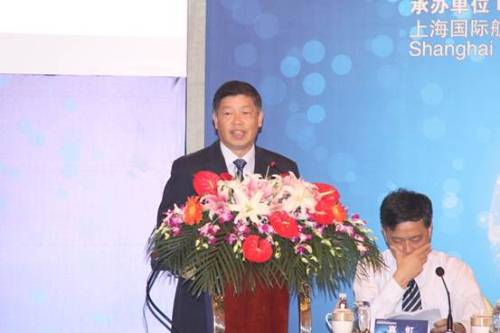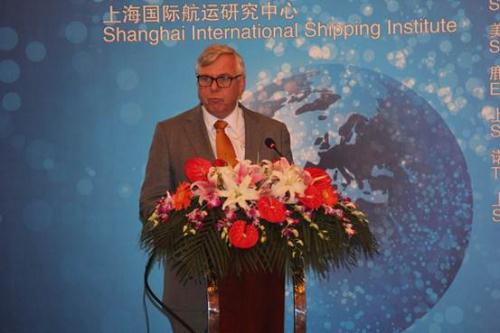|
On July 3, 2014, the SISI Forum on International Shipping & Port Development 2014 - Interactive Development of Free Trade Zone and Shipping & Port Industry was grandly held at the Sheraton Shanghai Hongkou Hotel. The forum was hosted by Shanghai Maritime University and SISI, co-hosted by China Academy of Transportation Sciences of the Ministry of Transport, State University of New York, Erasmus Smart Port Rotterdam (ESPR), China Institute of FTZ Supply Chain, Shanghai Advanced Institute of International Shipping, Shanghai Elite Shipping Consulting Co., LtdShanghai Shipping Consulting, T&Z Consultants Limited and Shanghai Changxing Ocean Marine High-tech Industrial Investment & Development , Co., Ltd, and supported by Water Transport Bureau of the Ministry of Transport, Shanghai Municipal Transportation Committee and Shanghai Hongkou District Government.

SISI introduced the latest progress on China Shipping Prosperity Index (CSPI). After the CSPI was released, SISI also launched the Dry Bulk Shipping Prosperity Index (DSPI) in order to better reflect the trend in shipping segments and serve special types of shipping enterprises. Based on the professional expert panel, the DSPI will be an important barometer for the Chinese bulk shipping market. At the forum, Xu Zuyuan, former vice president of the Ministry of Transport and Chairman of China Institute of Navigation, Xu Guoyi, director of Shanghai Maritime Safety Administration, Li Ying, deputy director of Wuhan New Port Administration Committee, and Zhang Lin, deputy director of Shanghai Municipal Transportation Committee, conferred certificates to representatives of the CSPI expert committee.
Professor Shmuel Yahalom, a foreign port & shipping expert from SUNY Maritime, comprehensively introduced the functions, duties and governance structure of ports in the US, providing references for the free trade zone (FTZ) to explore the new port & shipping management system.
Professor Harry Geerlings from ESPR gave a professional analysis of the climatic impacts caused by greenhouse gas emissions from the port & shipping industry. He proposed to reduce energy consumption by improving port machinery and equipment and optimizing port operation, and called for joint efforts between government and enterprises to push for the green and sustainable port development.

At the themed forum on “New Mode for Port & Shipping Development” in the afternoon, Huang Youfang, President of Shanghai Maritime University, delivered a speech titled New Mode for FTZ-based Supply Chain Development. He emphasized that the development of the pilot FTZ will exert a significant influence on port, shipping and the entire supply chain, and will give rise to the new mode for supply chain development.
Professor Guan Changqian from the US Merchant Marine Academy applied economics theories to explain the shipping cycle and analyze the main characteristics of world economy and the three major shipping markets in the world. The structure of world economic growth is increasingly diversified. While developed countries begin to see continuous economic growth, main emerging economies like China are experiencing economic slowdown, and Ukraine and the Middle East are the major uncertainties affecting the economic growth. The container market is recovering slowly from the recession, trade growth in the dry bulk market surpasses demand growth for the first time since 2007, but the large number of new orders will prevent the market from further recovery. The oil shipping market will look at a new transportation layout, and the US crude oil and oil product market will go through substantial changes. Professor Guan also discussed key factors that affect the market, including LNG ship, change of trade landscape and decelerated shipping.
|